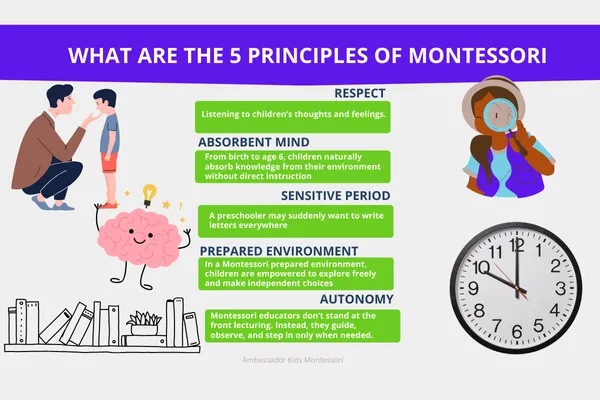
What Are the 5 Principles of Montessori?
Understanding Montessori Principles
When parents first hear about Montessori education, it can feel like a mystery. What makes it different from traditional schooling? Is it only for certain children? The truth is, the Montessori philosophy is built on five core principles that guide how children learn and grow.
At Ambassador Kids Montessori, we bring these principles to life every day. They shape our classroom, our interactions and the way we encourage children to develop independence and confidence. Let’s walk through the 5 principles of Montessori and see why they’re so powerful.
Principle 1: Respect for the Child
At the heart of Montessori education is respect. Children are capable of making choices, solving problems and learning in meaningful ways when given the chance.
In a Montessori classroom, respect looks like:
Listening to children’s thoughts and feelings
Allowing them to choose their work within safe boundaries
Encouraging independence instead of rushing to do it for them
When children feel respected, they begin to respect others and themselves. This foundation builds empathy, responsibility and confidence that last a lifetime.
Principle 2: The Absorbent Mind
Maria Montessori described children’s minds as absorbent. From birth to age 6, children naturally absorb knowledge from their environment without direct instruction.
Think about how easily young children pick up language. They don’t need flashcards. They learn simply by hearing words spoken around them. In the same way, they absorb math, social behavior and problem-solving skills.
In Montessori classrooms, we nurture this absorbent mind by providing rich, hands-on experiences that children remember and build upon.
Principle 3: Sensitive Periods
Children go through sensitive periods, which are windows of time when they are naturally drawn to learning specific skills. For example:
A toddler may be fascinated with putting things in order
A preschooler may suddenly want to write letters everywhere
Another child may pour water from pitcher to pitcher for weeks
Instead of ignoring or stopping these interests, Montessori teachers lean into them. By offering the right materials at the right time, we help children master new skills joyfully and successfully.
Principle 4: The Prepared Environment
A Montessori classroom is called a prepared environment, which is a space designed specifically for children’s independence and exploration.
In this environment:
Materials are organized and accessible
Everything has a place and purpose
The classroom is calm, beautiful and structured
This setup encourages children to take ownership of their learning. When a child can move freely, select their own work and return it neatly, they feel empowered and capable.
Principle 5: Auto-Education/Atonomy (Self-Directed Learning)
The last principle is auto-education, which is the idea that children are naturally able to teach themselves when given the right tools.
Montessori educators don’t stand at the front lecturing. Instead, they guide, observe and step in only when needed. Children engage with hands-on materials and learn through exploration.
This doesn’t mean there is no structure. It means children are trusted to rise to the challenge. With guidance and freedom, they grow into confident, independent learners.
Why the 5 Principles of Montessori Matter
When all five principles come together, the results are powerful. Children in Montessori schools:
Develop independence and self-confidence
Learn social skills through respect and collaboration
Gain academic knowledge in a way that sticks
At Ambassador Kids Montessori in Fort Lauderdale, we see these principles at work every day. They’re the reason children leave our classroom not only smarter but also more confident, curious and ready for life.
Which of these Montessori principles do you see in your child already?
Come visit our classroom and discover how we can help nurture that spark.
👉 Schedule your tour today and discover Montessori for your family.
